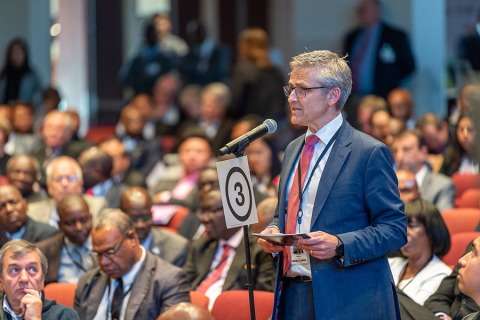During a regularly scheduled meeting on April 9, the Iowa-Missouri Conference Executive Committee approved the following response to the General Conference’s “Unity in Mission” document:
After much prayer and reflection, the Iowa-Missouri Conference Executive Committee wishes to communicate the following thoughts in response to the “Unity in Mission” document voted by the General Conference Executive Committee during the 2016 Annual Council.
- We affirm the need for the church—at every level of organization—to be unified for the mission Christ gave us, in answer to His prayer found in John 17:11, 20-23.
- We affirm the call to actively listen, consult with one another, and spend time together in prayer as we discuss any differences that arise.
- We affirm, as stated in the “Unity in Mission” document, that “God is our infallible Leader” and “His followers won’t always get it right.”
We also wish to express the following significant concerns:
- Because God alone is infallible and His followers don’t always get it right, it is dangerous for us to elevate man-made policies, procedures, and voted actions to be equally binding with our fundamentally held biblical beliefs. There must be flexibility in policies to accommodate regional cultures and customs (i.e. one size does not fit all).
- We are perplexed by the document’s omission and disregard for the Protestant organization of our church. The reorganization of the Seventh-day Adventist Church in the early 20th century reaffirmed not only the protestant principle of sola scriptura, but also the protestant principle of the priesthood of all believers (in this context a decentralized form of governance in which the people in the various fields hold authority—in subjection to Christ alone—over their own territories, with the freedom to make decisions that are best for their fields without outside interference or mandates).
- The document clearly ignores steps already in place for dealing with a union, local conference, or church that is suspected of “being in apostasy, or that . . . refuses to operate in harmony with denominational policies and constitutional requirements, and is in rebellion” as outlined in existing GC working policy. The “Unity in Mission” document supposes to supplant the procedures outlined in section B95 by giving new, unprecedented authority to the General Conference to bypass the divisions to deal directly with unions and, presumably, conferences and churches—in any way it sees fit. This is clearly not a Protestant view, but rather an exercising of “kingly power” that cannot go unchallenged.
The direction this document takes the church is troubling to say the least. Unity cannot be forced upon people through policy and voted actions. To attempt to do so is a sharp departure from the practice of Protestantism in the Seventh-day Adventist Church—the result of which could only hope to produce uniformity, not unity. The only One who can bring unity is the Holy Spirit, and we further affirm His role to that end.
“In matters of conscience the soul must be left untrammeled. No one is to control another’s mind, to judge for another, or to prescribe his duty. God gives to every soul freedom to think, and to follow his own convictions. ‘Every one of us shall give account of himself to God.’ No one has a right to merge his own individuality in that of another. In all matters where principle is involved, ‘let every man be fully persuaded in his own mind’ (Romans 14:12, 5). In Christ’s kingdom there is no lordly oppression, no compulsion of manner. The angels of heaven do not come to the earth to rule, and to exact homage, but as messengers of mercy, to co-operate with men in uplifting humanity” (DA 550).
May God continue to guide and lead us as we prayerfully seek to fulfill His mission for our church.




